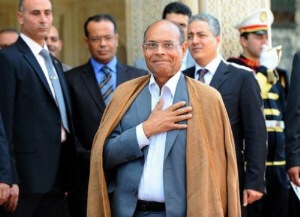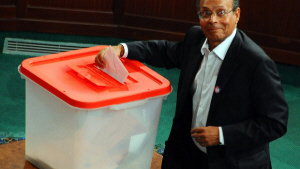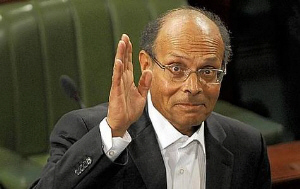The North African nation on Tuesday swore in veteran opposition rights activist Moncef Marzouki as its first elected president, almost a year since the Arab Spring started in Tunisia.
 The North African nation on Tuesday swore in veteran opposition rights activist Moncef Marzouki as its first elected president, almost a year since the "Arab Spring" started in Tunisia.
The North African nation on Tuesday swore in veteran opposition rights activist Moncef Marzouki as its first elected president, almost a year since the "Arab Spring" started in Tunisia.
The 66-year-old French trained doctor, who was forced into exile for a decade by former strongman Zine el Abidine Ben Ali, had tears in his eyes when he solemnly promised to be the "president of all Tunisians".
"I have the great honor of becoming the first president of the first free republic of the Arab world," Marzouki, wearing a traditional camel-colored tunic over his jacket, told media sources his inauguration.
"I will be the guarantor of the national interests, the state of laws and institutions," he said with his hand on the Holy Qora’n as he took his oath before the constituent assembly that had elected him on Tuesday.
 His first task will be to name Hamadi Jebali -- the number two of the moderate Islamic Ennahda party which won October elections -- as prime minister of a new government to be unveiled on Wednesday, he told reporters.
His first task will be to name Hamadi Jebali -- the number two of the moderate Islamic Ennahda party which won October elections -- as prime minister of a new government to be unveiled on Wednesday, he told reporters.
"I will be faithful to the martyrs and to the objectives of the revolution," the new leader said. "Without their sacrifice, I would not be here," he added.
The new Tunisian leader said "our mission is to promote our Arab-Muslim identity and be open to the world; to protect the veiled (women) and girls in niqab as well as those who aren't veiled," promising to safeguard health, education and women's rights.
Calling for national reconciliation, he urged the opposition "to participate in the nation's political life and not confine itself to a role of observer".
 On Monday Marzouki was elected with 153 votes in the 217-member constituent assembly, with three of the 202 deputies present voting against, two abstaining and 44 opposition members casting blank ballots.
On Monday Marzouki was elected with 153 votes in the 217-member constituent assembly, with three of the 202 deputies present voting against, two abstaining and 44 opposition members casting blank ballots.
Marzouki, who headed the Tunisian League for the Defence of Human Rights (LTDH) from 1989 until Ben Ali supporters forced him out in 1994, known as a deep-seated passion for human rights.
Marzouki, a father of three, is divorced from his French wife. A prolific writer, he has penned several books in French and Arabic including one titled "Dictators on Watch: A Democratic Path for the Arab World."